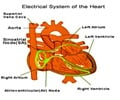Factors, which trigger irregular heartbeat and sudden cardiac death in presence of a genetic disorder have been identified by researchers.

The first study identified differential conditions and cellular mechanisms that can trigger SCD when LQTS is a factor, and the second study, for the first time, directly linked sex hormones and the incidence of arrhythmia and SCD.
It is known that genetic mutations can predispose individuals to arrhythmia and/or SCD. Between one in 2,500 and one in 5,000 individuals are born with mutations that cause LQTS, a disorder of the heart's electric system, and a determining factor in the development of arrhythmia and/or SCD.
Ninety percent of the known mutations cause loss of function of ion channels responsible for LQTS types 1 and 2 (LQT1 and LQT2).
LQTS leads to a prolonged "QT interval" on electrocardiograms. The QT interval refers to the time it takes the chambers of the heart to "repolarize" themselves so that the heart is ready for another contraction cycle.
When this timeframe is lengthened, it is associated with triggering irregular arrhythmia that can cause sudden cardiac arrest.
Advertisement
In the study, Gideon Koren, M.D., a physician researcher and colleagues studied early afterdepolarizations (EADs), an abnormal depolarization during the plateau phase of the heart electrical activity (action potential) that can initiate arrhythmia, and a hallmark of LQTS. The focus was on mechanisms underlying different high-risk conditions that trigger EADs.
Advertisement
In LQT1, however, these conditions result in relatively limited prolongation and no EADs. In contrast, isoproterenol that mimics cardiac stimulation by the sympathetic system causes arrhythmias in single cells only in LQT1 heart cells.
In a second study, Koren and his colleagues furthered their understanding of arrhythmias by studying the impact of sex hormones.
"Quite simply, we demonstrate that estrogen promotes major cardiac events - such as polymorphic ventricular tachycardia (pVT) and SCD - while progesterone prevents them when LQT2 is a factor. Estrogen has a pro-arrhythmic effect," Koren said.
Sex differences in long-QT-related arrhythmias with a higher risk of pVT and SCD have been well-documented in the clinical setting, and the risk is higher in women than in men, particularly during the postpartum period.
"We show for the first time a direct link between sex hormones and the incidence of arrhythmias and sudden cardiac death."
"Through our research in our animal models, we have demonstrated that progesterone significantly reduces triggers for polymorphic ventricular tachycardia. At the same time, we were able to show that progesterone is protective and prevents SCD when LQT2 is present," Koren added.
Koren explained that this finding suggests that high progesterone levels during pregnancy likely account for the reduced risk of SCD in LQT2 patients during pregnancy. The marked reduction in progesterone during the postpartum period, however, likely promotes arrhythmias and SCD in these patients. Their findings also indicated that estrogen increases both trigger and sustainability of pVT, and thereby promotes major cardiac events.
The studies have been published in the Journal of Physiology and the HeartRhythm Journal.
Source-ANI













